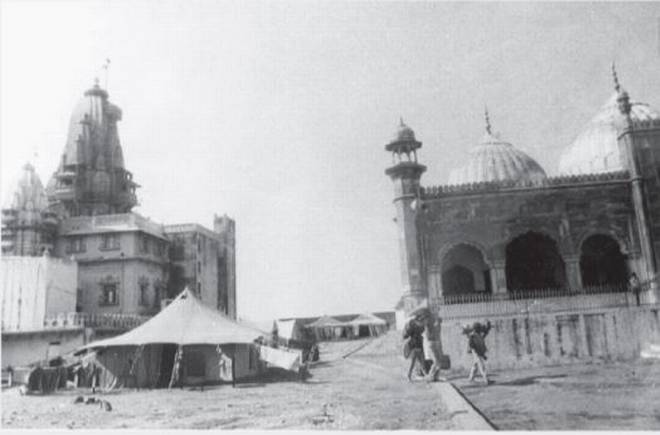All about the Places of Worship (Special Provisions) Act, 1991 19/11/2019 – Posted in: Daily News – Tags: Babri Masjid-Ram Janmabhoomi dispute, Gyanvapi mosque in Varanasi, the Shahi Idgah in Mathura., Vishwa Hindu Parishad
The Places of Worship (Special Provisions) Act, 1991
For: Preliminary & Mains
Topics covered:
- About the Places of Worship (Special Provisions) Act, 1991
- Main features & Objectives of the Act
- Relation with Ram Mandi – Babri Masjid Case
- Relation with Sabarimala temple case
News Flash
Supreme Court in its recent judgement commended the enactment of the Places Of Worship Act, 1991 as one that preserved the constitutional value of secularism by not permitting the status of a place of worship to be changed.
Background
During the 1990s in the Babri Masjid-Ram Janmabhoomi dispute, the Vishwa Hindu Parishad (VHP) and other Hindu organisations also laid claim to two other mosques — the Gyanvapi mosque in Varanasi and the Shahi Idgah in Mathura. Although the radicals in the Hindu camp often spoke of reclaiming 3,000 mosques across the country, they threatened to start agitations only with respect to these two places of worship.
In this backdrop, in September 1991, the P.V. Narasimha Rao government enacted, a special law to freeze the status of places of worship as they were on August 15, 1947.
Objectives of the act
- The aim of the Act was to freeze the status of any place of worship as it existed on August 15, 1947.
- It was also to provide for the maintenance of the religious character of such a place of worship as on that day.
- It was intended to pre-empt new claims by any group about the past status of any place of worship and attempts to reclaim the structures or the land on which they stood.
Main Features
- The Act declares that the religious character of a place of worship shall continue to be the same as it was on August 15, 1947.
- It says no person shall convert any place of worship of any religious denomination into one of a different denomination or section.
- It declares that all suits, appeals or any other proceedings regarding converting the character of a place of worship, which are pending before any court or authority on August 15, 1947, will abate as soon as the law comes into force. No further legal proceedings can be instituted.
Exception
- These provisions will not apply to ancient and historical monuments and archaeological sites and remains that are covered by the Ancient Monuments and Archaeological Sites and Remains Act, 1958; a suit that has been finally settled or disposed of; and any dispute that has been settled by the parties or conversion of any place that took place by acquiescence before the Act commenced.
- The Act does not apply to the place of worship commonly referred to as Ram Janmabhoomi-Babri Masjid in Ayodhya.
Penal provisions in the Act
- Anyone who defies the bar on the conversion of the status of a place of worship is liable to be prosecuted.
- The Act provides for imprisonment up to three years and a fine for anyone contravening the prohibition.
- Those abetting or participating in a criminal conspiracy to commit this offence will also be punished to the same extent.
Did the Supreme Court refer to this Act in its Ayodhya judgment?
- In its verdict, the Supreme Court commended the enactment as one that preserved the constitutional value of secularism by not permitting the status of a place of worship to be changed.
- The state has, by enacting the law, enforced a constitutional commitment and operationalised its constitutional obligations to uphold the equality of all religions and secularism, which is a part of the basic features of the Constitution.
Source: The Hindu
READ MORE DAILY NEWS
- Justice Sharad Arvind Bobde becomes 47th CJI
- Special “Winter-Grade Diesel”
- Bhaona – Assam’s folk theatre
- System of Air Quality and Weather Forecasting And Research (SAFAR) study
- Sabarimala temple Issue: SC verdict
- Flood in Venice, Italy
- Cyclone Bulbul-Matmo
- No RTO check-posts in Gujarat from November 20
You are on the Best Online IAS preparation platform. You are learning under experts.
We are present on Facebook- Diligent IAS, LinkedIn- Diligent IAS, YouTube- Diligent IAS, Instagram- Diligent IAS. Get in touch with us.

